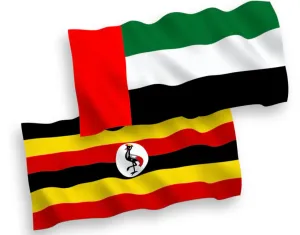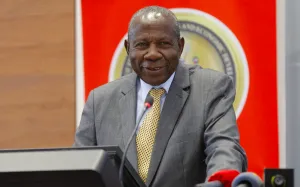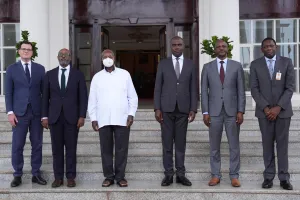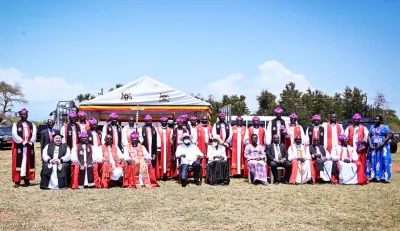
Work on the long-anticipated Ntenjeru–Bule Road has come to a standstill less than a month after construction began, as a cultural conflict has erupted in Mpata Village, Mukono District. The project, an 18-month undertaking forming part of the 18.5-kilometre Ntenjeru–Bule route under the World Bank funded Greater Kampala Metropolitan Area Urban Development Program, was officially launched on October 2nd, 2025 by the Minister for Kampala and Metropolitan Affairs, Hajjat Minsa Kabanda.
China Railway Number 5 Engineering Group Company Limited is implementing the first 7.8-kilometre phase at a cost of Shs 35.7 billion. Although progress had initially been steady, residents recently halted activity, arguing that the planned road cuts through a protected cultural landmark.
The dispute centres on Namuzikiza, a sacred tree belonging to the Lugave (Pangolin) clan. Clan representatives insist that disturbing or relocating the tree requires extensive rituals and significant financial resources. They are requesting Shs 650 million to support the process of transferring the sacred tree along with other heritage sites.
According to Masiko Mulo, the custodian of the Lugave cultural grounds, the construction route would also affect three revered wells, Nakagga, Namagulu, and Mpakanya. Each well, he noted, is associated with ancestral goddesses and must be honoured through traditional ceremonies before any heavy equipment can proceed.
District officials, however, have advised the petitioners that World Bank regulations do not permit compensation to individuals, a limitation that has further complicated negotiations. Religious leaders who inspected the scene have rejected the traditional healers’ demands, condemning them as unnecessary and calling for “divine intervention.” They urged villagers to let go of what they labelled outdated ritual obligations.
During a joint inspection by district authorities, government representatives, and supervising engineers from Professional Engineering Consultants, Gesh Consultants, and MDF, Ms. Martha Lynn Rwaboona, speaking on behalf of the contractor, confirmed that construction teams had already diverted around some contested areas. She emphasized that the company is committed to respecting cultural sites and must address such matters “with utmost sensitivity.”
Mukono District NRM chairman Hajji Harunah Ssemakula criticized the fact that a spirit shrine was delaying a public project and promised to personally visit the site to begin talks with the custodians. Meanwhile, Hajji Sekayivu Ibrahim, who represents traders on the Mukono District Development Forum, accused residents of “holding onto outdated beliefs,” warning that such behaviour risks hindering development. He recommended stronger community engagement.
Local leader Male Byekwaso encouraged all stakeholders to cooperate, suggesting that Namuzikiza could be relocated in a way that honours tradition while allowing construction to continue. Mukono District Chief Administrative Officer Henry Ddamba reassured the community that the contractor is still on track overall. He pledged an inclusive negotiation process and expressed hope that the Namuzikiza tree could be preserved. He also urged residents to support the project, arguing that the improved road will enhance access to markets and boost both business and agriculture.
For now, work on the contested section remains paused as clan representatives, government officials, and the contractor seek a compromise. The outcome of their discussions is expected to influence how cultural heritage is handled in future infrastructure developments across the region.
URN













The Sunrise Editor
Leave a Comment
Your email address will not be published.